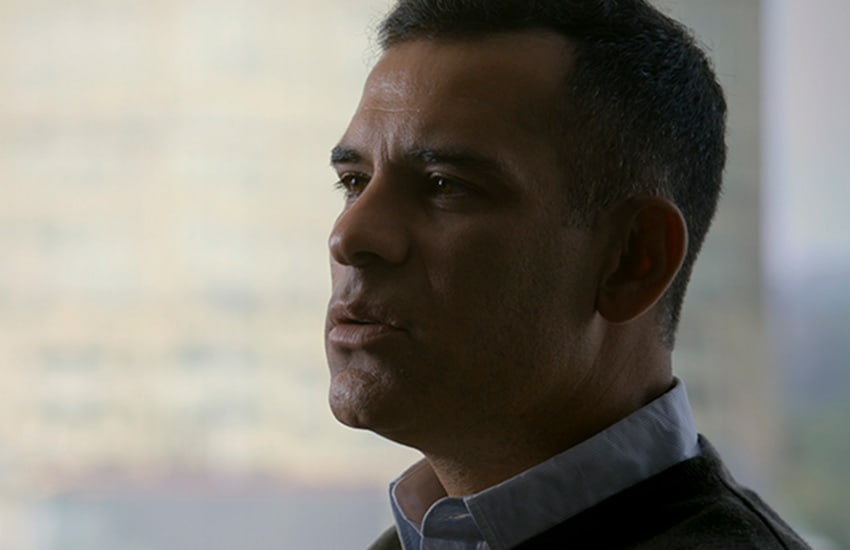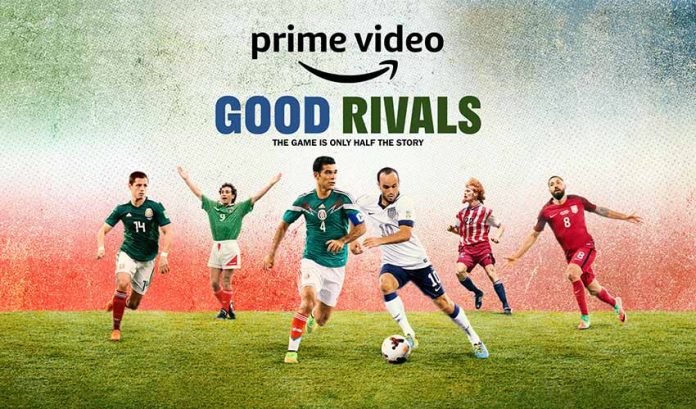Historically, Mexico has dominated the U.S. in men’s soccer, but more recently, the Americans have been coming into their own. With both nations qualifying for this year’s World Cup in Qatar, a new Amazon Prime docuseries takes a look at their complex relationship on the soccer field.
The three-part documentary, “Good Rivals,” directed by Academy Award-nominated Nicaraguan filmmaker Gabriel Serra, premieres on Amazon Prime on Thursday.
“The rivalry is at the level of many important rivalries,” Serra said. “France and Italy, for example. Germany and England. Barcelona and Real Madrid … People really, really get passionate about it.”
The passion is on full display in this docuseries, whether it’s Mexico’s El Tri supporters wearing lucha libre masks at Estadio Azteca or American fans brandishing the Stars and Stripes at Crew Stadium in Columbus, Ohio.

Yet the series explores other dimensions of the rivalry. There’s the border that both unites and divides the two nations, as well as tensions over immigration, jobs and crime that have been fanned by politicians through the years, from Ronald Reagan to Donald Trump.
There are also protagonists who embody the complications of the Mexico-U.S. relationship, many of whom are interviewed, including Mexico soccer legend Hugo Sánchez to Major League Soccer commissioner Don Garber.
Filming included some memorable exchanges between Team USA coach Gregg Berhalter and his players, Serra said.
“Sometimes he would bring personal stories to the players,” he said, “or metaphors of animals, of fighting, intensity.”
The filmmaker called this year’s U.S. World Cup team “a very united group, a very diverse group. The talent [Berhalter] has on the team is impressive.”
As for El Tri, “I think Mexico has a very difficult group” to play against, which includes Argentina and Poland, Serra said.
Growing up in Nicaragua, the future director played soccer himself, mostly forward, but also right wing. In his 20s, he made the documentary short film “La parka” (“The Reaper”), in which a slaughterhouse became a metaphor for life and death. It was nominated for an Oscar in the Best Documentary Short category in 2015.
“I think the connection that can be found in my life’s work,” Serra said, “is that the emotional and personal story is how I bring the storytelling and conflict, the drama and structure, to a project … I think emotions always have to be at the heart of a documentary.”

In making “Good Rivals,” Serra focused on two players – Rafael Márquez of Mexico and Landon Donovan of the U.S.
Growing up in Zamora, Michoacán, Márquez felt pain over his grandfather’s decision to abandon the family to migrate to the U.S. Meanwhile, Donovan came of age in Redlands, California, where he honed his soccer skills by watching Hispanic players who he said played better than their Anglo teammates.
Márquez’s and Donovan’s careers intersected at a critical moment 20 years ago. Team USA stunned Mexico, 2-0, in an elimination game at the 2002 World Cup in South Korea. Donovan scored the second goal, while Márquez picked up a red card – one of just two he would receive in his career.
“It was very intense for [Márquez] to play against the U.S.,” Serra said, citing Márquez’s feelings about his grandfather. “I think these personal issues, personal matters and things, bring a lot of passion to the rivalry.”
In Mexico, soccer is the national sport. The country has hosted two World Cups, in 1970 and 1986. The latter World Cup inspired a nation that was reeling from the devastating earthquake of the previous year. Under coach Bora Milutinović, Mexico reached the quarterfinals, its best showing to date.
By that point, the U.S. had a record of achievement in many other sports but not the internationally beloved game of soccer. Things began to change when the U.S. hired Milutinović to coach the national team. An improbable Gold Cup victory over Mexico followed in 1991.
“Bora Milutinović was a very important character in the [documentary] series,” Serra said. “He migrated to Mexico, was married with a Mexican wife, had a Mexican kid. Suddenly, he came to train with the U.S. in 1990.”
In 1994, the U.S. hosted a World Cup of its own. There exists man-on-the-street interview footage of Americans not knowing what the World Cup was. Yet, the following decade, savvy American fans would adopt a particular chant when their team played Mexico: “Dos a cero” – “two to zero” – a reference to an increasingly common margin of victory in these games.
Coach Bora Milutinović took Mexico to a World Cup quarterfinals in the 1980s and the U.S. Team to a Gold Cup championship in 2022.Serbian coach “Bora” Velibor #Milutinović has attended 5 times the #WorldCup as manager with 5 teams, although he did it in 5 consecutive #WorldCups: Mexico (1986), Costa Rica (1990), the United States (1994), Nigeria (1998), and China (2002). @Trivia_WorldCup pic.twitter.com/L8LDLd6v0S
— Fútbolismo ⚽️🌎🌍🌏⚽️ (@ftblsm) January 16, 2019
It wasn’t just the Mexican players who were stunned, but also Mexican and Mexican-American fans who attended Team USA’s home games at venues such as Los Angeles to cheer for El Tri. “It was a very uncomfortable situation,” Serra said, for “American players to be in their home and not having support.”
One result, he added, was the U.S. decision to hold games against Mexico in Columbus – “an incredible space where, for almost 15 years, Mexico couldn’t win [over] the U.S. I think for Americans, and also in the case of Landon, when they won in their terrain in Columbus, it was a very emotional, very important event for them, for the country and for soccer also.”
Yet, there were moments when wider events transcended the rivalry. In 2016, the teams played three days after Donald Trump was elected president. As a candidate, Trump had made an incendiary statement about Mexican migrants being drug dealers and rapists. When the U.S. and Mexican teams met in Columbus, Márquez’s goal propelled Mexico to a win. Arguably more compelling was what happened before play started: The teams posed for a photo together, hugging each other.
The docuseries envisions future cooperation between Mexico and the U.S. – including during the 2026 World Cup, when they will assist Canada with hosting duties.
“Hugo Sánchez makes a very important statement in the third chapter,” Serra said. “He … wishes for soccer to unite North American countries and relationships. He hopes the relationship between North American countries gets better and that soccer can be a path to it.”
Rich Tenorio is a frequent contributor to Mexico News Daily.
